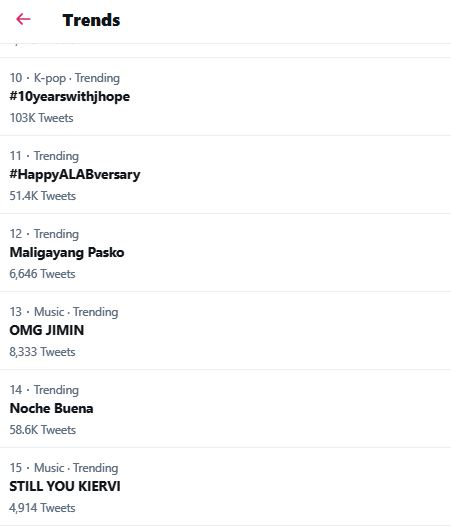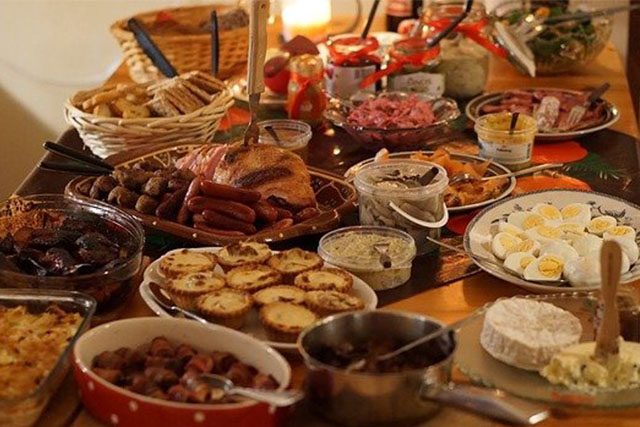Filipinos shared how they are preparing for the upcoming “Noche Buena” or the highly-anticipated traditional Christmas Eve feast as people greet the 25th of December.
As early as Thursday afternoon, the Spanish term for “night of goodness” landed on local Twitter’s trending list as social media users divulged how their respective families are planning to celebrate Christmas amid the coronavirus pandemic.

A Twitter user said that she created graham cake for the feast and hoped that it would be “delicious” since it was her first time to create one.
“Ready for Noche Buena,” she wrote with a two heart emoji.
Ready for Noche Buena💕
It's my 1st time i made graham🤗
Hope it's delicious😆💕 pic.twitter.com/BLJPAaUv4H— 🦋Princess Bethany Nicole👑🌟 (@iamprincessss28) December 24, 2020
Another Filipino took a vibrant picture of ube or purple yams that she said are part of their Noche Buena feast later.
My cousin/aunt brought these from Laguna for our Noche Buena pic.twitter.com/fNSE3Mzdl0
— Loucinda Hedd (@LoucindaHedd) December 23, 2020
Another Twitter user shared that her father brought boneless lechon or roasted sucking pig for the feast.
“Noche Buena is saved, the rest is just confetti,” she wrote.
Bless my dad, who just sent me this photo.
Noche Buena is saved, the rest is just confetti.
(Though I miss the lechon from Leyte. Life (and game) changer, I'm telling you.) pic.twitter.com/eej6Qxz3r0
— Grace⁷♦️♥️ #STREAMWagKangLilingon 👻😆 (@KweenJadis) December 24, 2020
A Filipino shared that she will cook Spanish sardines pasta in the style of Mary Grace Cafe.
The cafe is known to serve the Spanish sardines and olive pasta, which consists of Spanish sardines in a garlic and olive oil infusion. The dish is also topped with tomatoes and mushrooms.
I’ll be cooking Spanish Sardines pasta ala Mary Grace for Noche Buena! 🤍 🫒+🍝 +🐟
— Beverly Marie (@beelozada) December 23, 2020
Another Twitter user shared driving to Malabon City to buy kare-kare or meat and vegetable stew in peanut sauce and the famed Pancit Malabon for “Noche Buena.”
nag drive pa-Malabon para lang bumili ng paboritong kare-kare at pancit malabon, handa sa noche buena
12 years na rin yung nakalipas
— Kitton (@happykitton) December 24, 2020
“Noche Buena” is tied with the history of “Simbang Gabi.”
During the Spanish era, it was said that friars had required churchgoers to fast until Christmas morning but Filipinos would be usually hungry after coming back from the Christmas Midnight mass.
This prompted them to conjure up nocturnal meals before going to bed, giving birth to the tradition of “Noche Buena,” according to a report.
Some of the most famous meals in a Filipino “Noche Buena” feast include lechon, spaghetti, ham de bola, sweet macaroni salad, lumpia, queso de bola and leche flan, among others.
This Christmas, the Department of Health urged the public to refrain from partaking in long-table food spreads and to allocate meals individually instead to avoid gatherings.
Sharing of utensils is also discouraged since COVID-19 can be passed through respiratory droplets such as saliva. Each person is recommended to have his or her own pair of spoons and forks.
“While Filipino families are also fond of doing long-table food spreads, it is best to skip this practice this year and opt to allocate food individually,” the health agency said, as quoted by reports.
DOH also issued a circular listing down activities that are considered to be of high-risk, medium-risk and low-risk in terms of potentially contracting the virus.
Attending online masses, having video calls with families instead of gatherings and online Christmas shopping are listed as safe activities.
On the other hand, holding small gatherings outside one’s homes or in public areas that consider physical distancing protocols and the limitations on the number of attendees in mass gatherings are considered a moderate-risk activity.
These are encouraged to be conducted within less than 15 minutes to further prevent COVID-19 transmission.
DOH has already banned other Christmas traditions such as karaoke singing and street caroling, in light of the pandemic.










